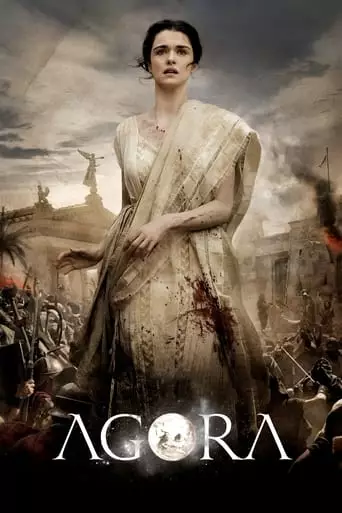
Agora (2009) Watch Online Free
A historical drama set in Roman Egypt, concerning philosopher Hypatia of Alexandria and her relationship with her slave Davus, who is torn between his love for her and the possibility of gaining his freedom by joining the rising tide of Christianity.
Agora (2009), directed by Alejandro Amenábar, is a historical drama set in 4th-century Roman Egypt, focusing on the life of Hypatia of Alexandria, a renowned philosopher and astronomer. The film portrays the intellectual and religious turmoil of the era, highlighting the decline of Greco-Roman polytheism and the rise of Christianity.
The narrative centers on Hypatia (Rachel Weisz), a brilliant and independent scholar who teaches philosophy and astronomy in Alexandria. Her dedication to science and rational thought places her at odds with the growing influence of religious factions. The film explores her relationships with her students, including the slave Davus (Max Minghella) and the prefect Orestes (Oscar Isaac), who are both enamored with her. As religious tensions escalate, the city of Alexandria becomes a battleground for ideological and political conflicts, leading to the destruction of the Serapeum, a symbol of pagan knowledge. Hypatia’s unwavering commitment to science and her refusal to conform to religious pressures ultimately lead to her tragic fate.
Agora is noted for its historical accuracy in depicting the cultural and religious dynamics of ancient Alexandria. The film’s cinematography captures the grandeur of the city and the intellectual vibrancy of the era. The performances, particularly by Rachel Weisz, convey the complexity of Hypatia’s character—a woman ahead of her time, dedicated to knowledge and truth. The film’s pacing and narrative structure effectively intertwine personal stories with historical events, providing a compelling portrayal of a pivotal period in history.
Agora delves into several profound themes:
Upon its release, Agora received critical acclaim for its ambitious storytelling and historical depth. The film was screened out of competition at the 2009 Cannes Film Festival and became the highest-grossing film in Spain that year. It garnered seven Goya Awards, including Best Original Screenplay, and was recognized for its contributions to historical cinema.
The film sparked discussions on the relationship between science and religion, the role of women in history, and the preservation of knowledge. Its portrayal of Hypatia brought attention to a lesser-known historical figure, inspiring renewed interest in her life and work. Agora also contributed to the discourse on religious tolerance and the importance of intellectual freedom, resonating with contemporary debates on these issues.
After watching Agora, viewers are likely to experience a mix of admiration and contemplation. The film’s portrayal of Hypatia’s unwavering dedication to knowledge and her tragic fate in the face of religious intolerance is both inspiring and poignant. The exploration of complex themes such as the conflict between science and religion, gender equality, and the preservation of knowledge may prompt reflection on the importance of intellectual freedom and the challenges of societal progress. The film’s historical context and emotional depth leave a lasting impression, encouraging viewers to appreciate the value of knowledge and the resilience of the human spirit.
